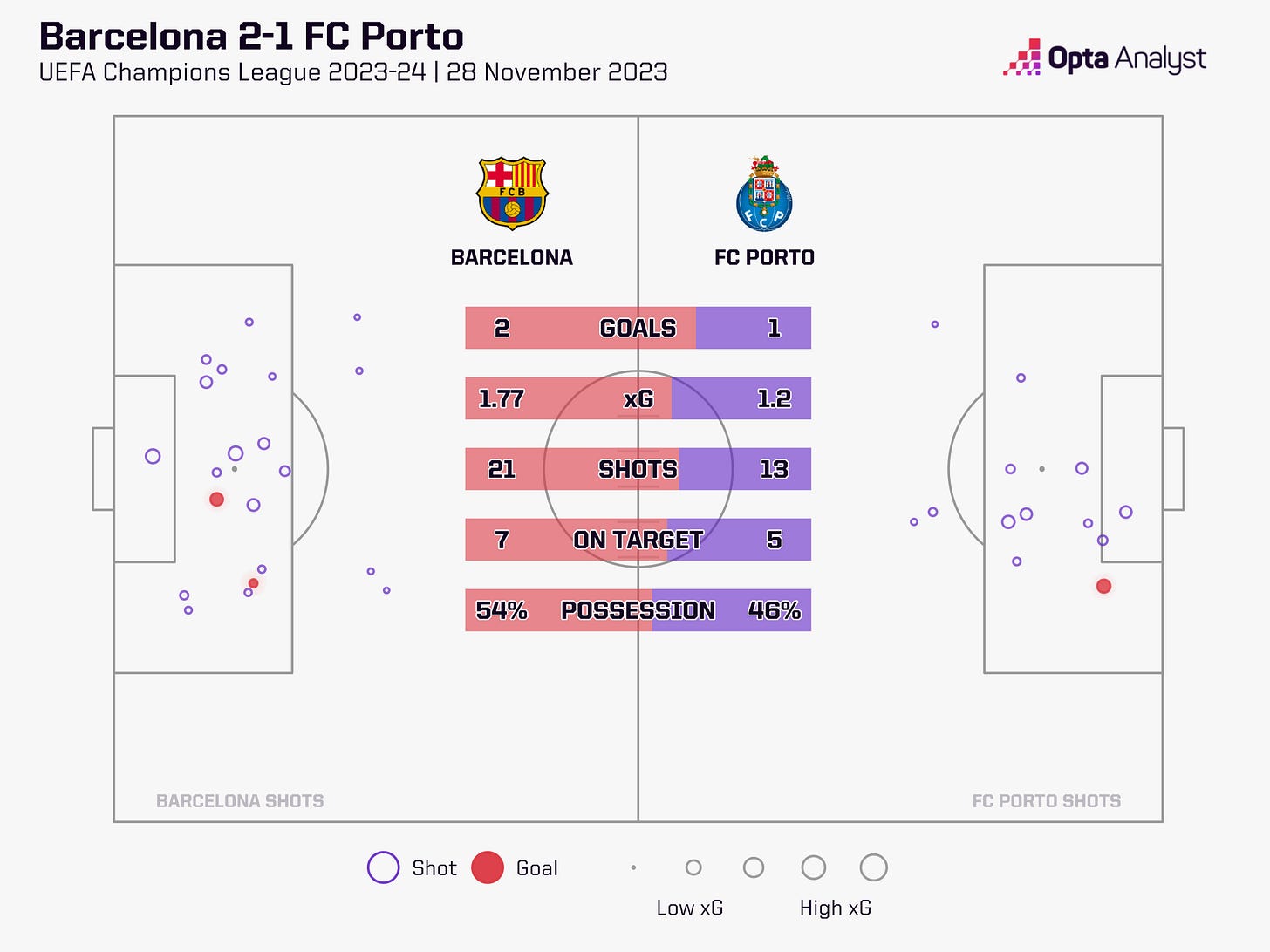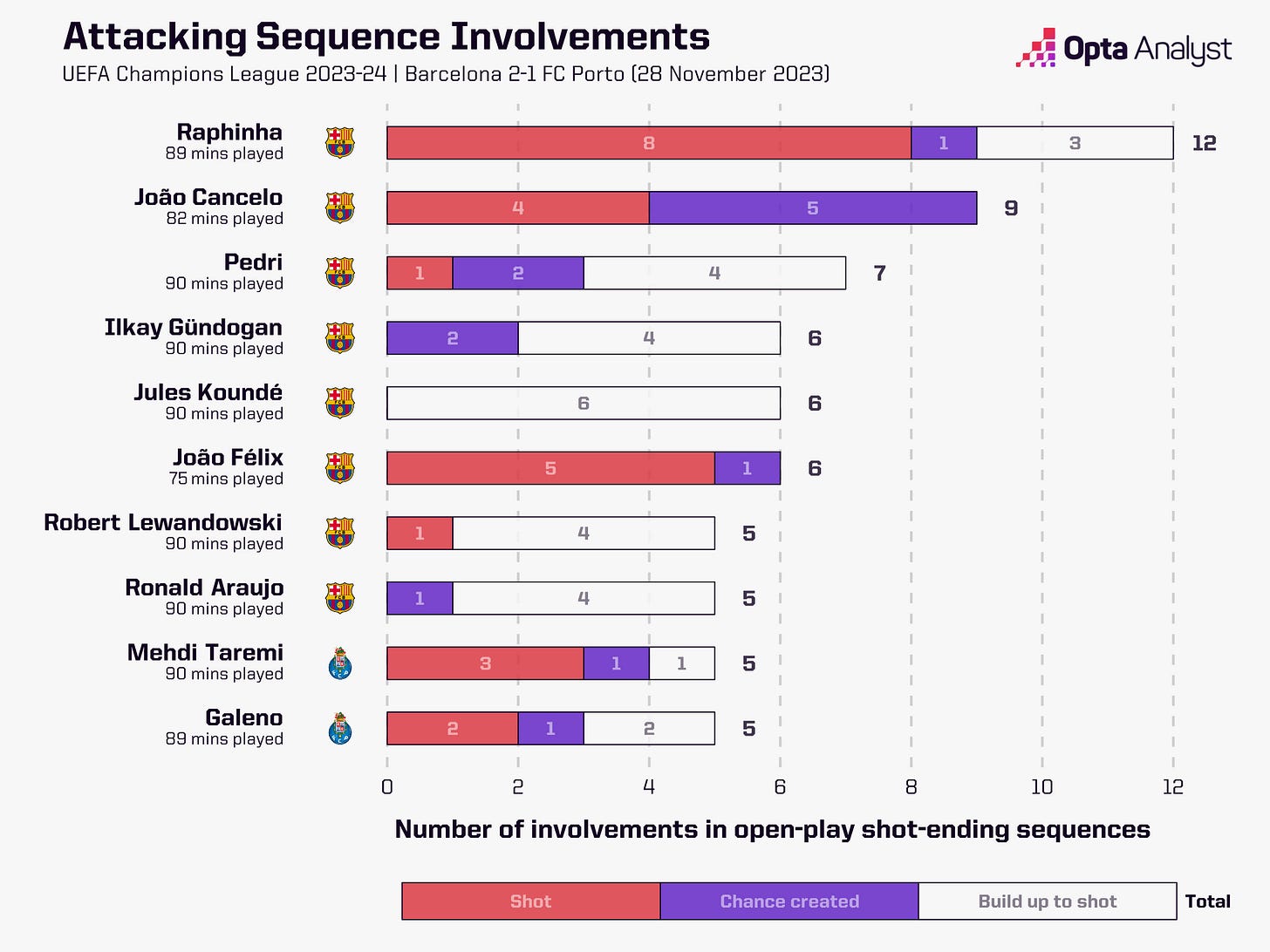For the first time since March 2021, Barcelona will play in the knockout rounds of the Champions League after they beat Porto 2-1 at the Estadi Olimpic Lluis Companys.
If that sounds like a fairly ridiculous statement, it’s because it kind of is. When Barcelona last played in the Champions League knockout rounds their manager was Ronald Koeman, a “lever” was something used to operate heavy machinery, people liked Marvel films and the Prime Minister of the UK was Boris Johnson.
It was forever ago.
FC Banterlona
Since then Barcelona have been slapped out of the group stages two years in a row. Sure, there have been reasons: both groups were incredibly tough, they’ve had big injuries to key men at crucial moments, Ronald Koeman was their manager and some of the officiating has been questionable at best.
But these are all excuses. Barcelona should have qualified out of both groups, they could even had won their group last year had Robert Lewandowski not shrivelled on his big return to the Allianz Arena against Bayern Munich.
So now Barcelona have finally returned to the knockout rounds, is everything good again? Well, maybe not, because they’ve somewhat limped over the line even though they have a game to spare.
Barcelona have played four, won three. Their 5-0 crushing of Royal Antwerp was great, but the two wins over Porto and the win over Shakhtar were all single goal victories, and last night’s Porto win was probably the best of them.
Domestically things aren’t going much better for Barcelona. After destroying Real Betis 5-0 (a few days before the Antwerp game, incidentally) in the middle of September, they’ve been inconsistent and/or prosaic.
The comeback win over Celta Vigo was invigorating and a great display of mental strength, but why were they 0-2 down in the first place? The draws with Mallorca and Granada showed a team that was far too vulnerable defensively.
The wins over Sevilla, Athletic and Real Sociedad were all unconvincing (for a variety of different reasons) and they bracketed the international break with disjointed displays against Alaves (a 2-1 win) and Rayo (a 1-1 draw).
El Clasico was the highlight of this period in terms of performance. For an hour Xavi’s men purred and pummelled Real Madrid in the Saturday sunshine, but they scored just one goal, then Jude Bellingham went all “Jude van Nistelrooy” and scored two goals from two shots and Los Blancos walked away with a win.
All this has left Barcelona 4th in the table, four points behind league leaders Madrid and Girona. They brought all that negative energy into the match against Porto and we saw that all over the first-half as they shambled around the field, scuffing clearances and scrambling to cover for each other.
Porto always play with confidence under Sergio Conceiçao, and so were more than happy to throw bodies at the discombobulated Blaugrana. They took the lead and could have added to that but for the relentlessness of Ronald Araujo and some big saves from Iñaki Peña deputising for Marc-André Ter Stegen in goal.
In the end, Xavi did what he often does and adjusted his gameplan to lift his team. Joao Cancelo’s out of nowhere equaliser in the first-half meant it was level at the half, but Barcelona came flying out of the break and dominated the game in a much more classically “Barça” style. They created chances, Joao Felix taking one of them, and then saw the game out with relative ease (and Ronald Araujo).
What’s going wrong?
So, if they are capable of that, why on earth haven’t they been doing it for the last two months? Why has so much of the football been rubbish? Why does Robert Lewandowski only have two goals in his last eight games?
There’s a variety of reasons, but chief among them is injuries. Barcelona’s back-to-back 5-0 wins were the last time Frenkie de Jong completed 90 minutes before the weekend’s match against Rayo Vallecano.
De Jong’s injury came at a time when Barcelona were just learning to cope without Pedri. The young genius has missed 12 games this season, only returning against La Real and showing a clear lack of physical sharpness since.
Pedri was a key player for Barcelona last season, and his absences through injury were a large factor behind the Blaugrana’s offensive struggles in 2021/22. Xavi found a solution, thanks largely to De Jong’s increasing prominence in build-up phases.
But then the Dutchman went down. And he wasn’t the only one: Robert Lewandowski suffered an ankle injury just as he had finally found some goalscoring form. Raphinha had hamstring trouble as well. And even now that they’re all fit again, Gavi ruptured his ACL on international duty and is out for the season.
Whenever Xavi seems to solve a problem, an injury crops up and causes a different issue that Xavi has to now deal with. It’s like Barcelona cursed themselves somehow. Maybe this is karmic payback for getting to have Lionel Messi for 16 years? From the G.O.A.T. to lambs up for the slaughter.
Even now, injuries continue to blight the Blaugrana. The win over Porto was powered largely by Joao Cancelo’s mesmeric attacking display from left-back; but guess what? He had to leave the pitch with hamstring trouble and is a doubt for this weekend’s titanic clash with Atlético Madrid.
Cancelo’s injury could be a massive problem for Xavi. On paper it seems like it should be trivial, as Alejandro Balde will come in and play left-back and the 20 year-old is a defensive dynamo.
But that’s the problem: Balde’s best attributes are all defensive, he’s athletic, tenacious and a crisp tackler. What he is not is a great attacking force, which is a problem.
Xavi’s preference for a 3-2-2-3 shape in possession, where the left-back pushes up to play left-wing and the right-back forms a defensive three with the two centre-backs, means that whoever plays left-back needs to be an elite offensive presence.
This worked fine when Jordi Alba played left-back, or even when Marcos Alonso is up there (albeit Alonso presents other problems). But Balde is at his best on the defensive end, and that’s fine, he’s 20 years-old there’s plenty of time for him to grow — but Barcelona need production now.
That’s why Xavi turned to Joao Cancelo, and he was rewarded with a tremendous showing from the Portuguese winger. But if Cancelo is now injured it’s back to square one for the Catalan coach.
It’s not just injuries
Perhaps it wouldn’t be such an issue if the forwards were in fine form, but they aren't. Those 5-0 wins were notable for Barcelona’s performances but they were also the last time until last night’s Porto win that Joao Felix scored a goal.
The Portuguese star has been tremendously unlucky inbetween those goals, rifling several shots onto the woodwork and just snatching at what should be simple finishes too — but his profligacy has been an issue because it has compounded 35 year-old Lewandowski’s issues (which are at least partly to do with injury in addition to age).
Then on the right, Raphinha is having a miserable season. He got sent off in the opening game of the season against Getafe, and since returning from that suspension has played well just once: away to Mallorca where he had a goal and an assist in a 2-2 draw. Beyond that he’s either been injured or getting outplayed by a kid 10 years younger than him. Against Porto he took a lot of shots but none of them were good and he did precious little else to justify his start.
It’s indicative of Barcelona’s struggles that their most dangerous winger this season has been a 16 year-old kid who looks simultaneously like an electrifying young wizard and a boy being asked to play too often against men that want to hurt him.
Lamine Yamal is special. Hell, he’s special special. And Barcelona need to take care of him in a way they failed to do with Ansu Fati, they failed to do with Pedri, and even failed to do with Gavi.
All teenagers were overplayed, and while Pedri and Gavi were eventually broken by Luis de la Fuente’s brazen and callous mismanagement, physically overloading children as he gives rest to men, Barcelona set the stage for Spain’s killing strokes, and Ansu Fati’s issues are all on Blaugrana as well.
But such is the woeful form of Barcelona’s forwards that Xavi is in a position where he almost has to use Lamine Yamal as a regular member of his squad. Maybe if Ferran Torres were consistent, but even he only looks elite coming off the bench.
According to FBRef, Barcelona have the highest xG in La Liga (27.8) and the second-highest xGA (14.3). Yet they’ve scored just 27 goals and conceded 14. And sure, that looks good, they’re doing exactly what they should do.
But the best teams overshoot their numbers. Real Madrid have an xG of 25.6 and xGA of 15.2, yet they’ve scored 31 and conceded just 9. In the Premier League, Manchester City and Arsenal have xG’s of 25.6 and 22.6, yet have scored 33 and 27 goals respectively.
Now, sure, last season Barcelona also undershot their Expected Goals (scoring 70 goals off 75.5 xG) on their way to winning La Liga, but they also conceded just 20 goals off 33.2 xGA. Their defence was unsustainably monstrous, and so as they have conceded more this season, their inability to score consistently is more of a factor.
And that’s why, to put it bluntly, Barcelona kind of suck. Injuries to key players consistently force Xavi into tactical reshuffles and they frequently lack the firepower to shoot their way out of bad or middling performances, or even to turn on-pitch dominance (such as in the Clasico) into scoreline dominance.
How does Xavi fix it? Well, it’ll take time. And thanks to beating Porto and guiding Barcelona back into the Champions League round of 16, he will now have until February at the least (barring some disastrous results in the next few weeks and oh wait they’re playing Atlético Madrid and Girona next hmmm cool cool cool) so as long as no one else goes down injured he should be able to formulate some kind of solution.
If 97 Passes could offer one solution: drop Robert Lewandowski for teenage striker Marc Guiu (back from the U-17 World Cup) and see how long the Pole’s ego takes to trigger the bloodthirsty need for vengeance that drives all world-class goalscorers.
Beyond that? It’s over to you, Xavi!






